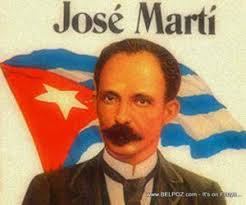JOSÉ MARTÍ COMENTA EN SUS ESCRITOS SOBRE LA ENTONCES NACIENTE DOCTRINA MARXISTA.
José Julián Martí Pérez nació un 28 enero 1853 en La Habana, Cuba y es el héroe nacional cubano, una figura importante en la literatura latinoamericana. En su corta vida fue un poeta, ensayista, periodista, filósofo revolucionario, traductor, profesor, editor, y un teórico político. También fue parte de los masones cubanos. A través de sus escritos y la actividad política, se convirtió en un símbolo para la candidatura de Cuba por su independencia contra España en el siglo 19, y se conoce como el “Apóstol de la independencia cubana”.
Marti, escribió sobre la amenaza del expansionismo de los Estados Unidos en Cuba. Pero tambien mostró con muchos años de antelación lo que nuevas proposiciones de doctrinas extranjeras pudieran causar mal, más que bien, a el futuro de la nación.
Comentando José Martí sobre la tendencia de muchos paises al entonces nuevo experimento Marxista nos dice:
Dos peligros tiene la idea socialista, como tantas otras; el de las lecturas extranjerizas, confusas e incompletas, y el de la soberbia y la rabia disimulada de los ambiciosos, que para ir levantándose en el mundo, empiezan por fingirse, para tener hombros en que alzarse como frenéticos defensores de los desamparados.
Los sistemas políticos en que domina la fuerza crean derechos que carecen totalmente de justicia, y el ser vivo humano que tiende fatal y constantemente a la independencia y al concepto de lo justo, forma en sus evoluciones rebeldes hacia su libertad oprimida y esencial, un conjunto de derechos de reconquista.
Un pueblo está hecho de hombres que resisten, y hombres que empujan: del acomodo que acapara, y de la justicia, que se rebela: de la soberbia, que sujeta y deprime, y del decoro, que no priva al soberbio de su puesto, ni cede el suyo: de los derechos y opiniones de sus hijos todos está hecho un pueblo, y no de los derechos y opiniones de una clase sola de sus hijos.
EL HOMBRE AMA LA LIBERTAD
El hombre ama la libertad, aunque no sepa que la ama, y anda empujado de ella y huyendo de donde no la halla.
Acaso los enemigos de la libertad lo son porque la juzgan por sus vociferaciones. Si conocieran sus encantos la dignidad que va con ella, lo rey que se siente el hombre libre, el perpetuo iluminamiento interno que la libre y decorosa conciencia de sí y ejercicio de sí producen, no habría acaso amigos mayores de la libertad que los que son sus más exímios enemigos…
Esa futura esclavitud —decía Martí—es el socialismo, Y añadía Martí, profetizando lo que pasaría en un estado socialista:
«Todo el poder que iría adquiriendo la casta de funcionarios, ligados por la necesidad de mantenerse en una ocupación privilegiada y pingüe, lo iría perdiendo el pueblo que no tiene las mismas razones de complicidad en esperanza y provechos, para hacer frente a los funcionarios enlazados por intereses comunes. Como todas las necesidades públicas vendrían a ser satisfechas por el estado, adquirirían los funcionarios entonces la influencia enorme que naturalmente viene a los que distrIbuyen algún derecho o beneficio. El hombre que quiere ahora que el estado cuide de él para no tener que cuidar él de sí, tendría que trabajar entonces en la medida, por el tiempo y en la labor que pudiése el estado asignarle, puesto que a éste, sobre quien caerían todos los deberes, se darían naturalmente todas las facilidades necesarias para recabar los medios de cumplir aquéllas.
De ser siervo de sí mismo, pasaría el hombre a ser siervo del estado. De ser esclavo de los capitalistas, como se llama ahora, iría a ser esclavo de los funcionarios. Esclavo es todo aquél que trabaja para otro que tiene dominio sobre él, y en ése sistema socialista dominaría la comunidad del hombre, que a la comunidad entregaría todo su trabajo. Y como los funcionarios son seres humanos y por tanto abusadores, soberbios, ambiciosos y en esa organización tendrían gran poder, apoyadas por todos los que aprovechan o esperaron aprovechar de los abusos y por aquellas fuerzas viles que siempre compra entre los oprimidos, el terror, prestigio o habilidad de los que mandan, este sistema de distribución oficial del trabajo común llegaría a sufrir en poco tiempo los quebrantos, violencias hurtos y tergiversaciones que el espíritu de individualidad, la autoridad y osadía del genio y las astacias del vicio originan pronta y fatalmente en toda organización humana…El funcionario autocrático, abusará de la plebe, cansada y trabajadora. Lamentablemente será y generará la servidumbre».
«La Futura Esclavitud», «La América» New York, Abril de 1984, página 954 de las Obras Completas de José Martí. Edición Conmemorativa del Cincuentenario de su muerte, Volume 1, Editorial Lex, La Habana, Cuba.
MARTI, MEXICO Y EL SOCIALISMO.
Su primera exposición ante el conflicto entre el capital y el trabajo la tuvo en México.
“El derecho del obrero no puede ser nunca el odio al capital: es la armonía, la conciliación, el acercamiento común de uno y de otro” (Escenas Mexicanas, 1875).
“La imitación servil extravía en economía como en literatura y en política… Tiene en cada país especial historia el capital y el trabajo: peculiares son de cada país ciertos disturbios entre ellos, con naturaleza exclusiva y propia, distinta de la que en tierra extraña por distintas causas tenga. a propia historia, soluciones propias. A vida nuestra, leyes nuestras. No se ate servilmente el economista mexicano a la regla, dudosa aún en el mismo país que la inspiró” (Escenas Mexicanas, 1875).
“Siempre es desgracia para la libertad que la libertad sea un partido” (Escenas Mexicanas, 1877).
“Es rica una nación que cuenta con muchos pequeños propietarios” (Nuestra América, 1878).
“Una Constitución es una ley viva y práctica que no puede construirse con elementos ideológicos” (Escenas Norteamericanas, 1882).
“Karl Marx ha muerto. Como se puso del lado de los débiles, merece honor. Pero no hace bien el que señala el daño, y arde en ansias generosas de ponerle remedio, sino el que enseña remedio blando al daño” (New York, 1883).
“La propiedad conserva los Estados” (Nuestra América, 1886).
LA CONQUISTA DEL PORVENIR
“La conquista del porvenir ha de hacerse con manos blancas. Más cauto fuera el trabajador de los Estados Unidos si no le vertieran en el oído sus heces de odio los más apenados y coléricos de Europa. Alemanes, franceses y rusos guían estas jornadas. El americano tiende a resolver en sus reuniones el caso concreto: y los de allende a subirlo al abstracto. En los de acá, el buen sentido y el haber nacido en cuna libre, dificulta el paso a la cólera. En los de allá, la excita y mueve a estallar, porque la sofoca y la concentra la esclavitud prolongada” (New York, 1883).
Es deber del hombre levantar al hombre: se es culpable de toda abyección que no se ayuda a remediar: sólo son indignos de lástima los que siembran traición, incendio y muerte por odio a la prosperidad ajena.
“Una revolución es necesaria todavía: la que no haga presidente a su caudillo, la revolución contra las revoluciones. ..!”.
“La tiranía es una misma en sus varias formas, aun cuando se vista en algunas de ellas de nombres hermosos y de hechos grandes”
ASESINOS ALEVOSOS
Palabras visionarias de José Martí (del siglo XIX), ante la naciente doctrina marxista.
“Asesinos alevosos, ingratos a Dios y enemigos de los hombres, son todos aquellos que con el pretexto de enseñar doctrinas modernas, dejan caer en los oídos de las juventudes un cúmulo de ideas, infiltrándoles el evangelio bárbaro del odio, en lugar de la doctrina sublime del amor.”
 JOSÉ MARTÍ COMMENTS IN HIS WRITINGS ABOUT THE THEN NASCENT MARXIST DOCTRINE.
JOSÉ MARTÍ COMMENTS IN HIS WRITINGS ABOUT THE THEN NASCENT MARXIST DOCTRINE.
José Julián Martí Pérez was born on January 28, 1853, in Havana, Cuba and is the Cuban national hero, an important figure in Latin American literature. In his short life, he was a poet, essayist, journalist, revolutionary philosopher, translator, teacher, editor, and political theorist. He was also part of the Cuban Freemasons. Through his writings and political activity, he became a symbol for Cuba’s candidacy for independence against Spain in the 19th century, and is known as the “Apostle of Cuban Independence.”
Marti wrote about the threat of US expansionism in Cuba. But it also showed many years in advance what new propositions of foreign doctrines could do harm, rather than good, to the future of the nation.
Commenting on the trend in many countries towards the then-new Marxist experiment, José Martí tells us:
The socialist idea has two dangers, like so many others; that of foreign, confused, and incomplete readings, and that of the arrogance and concealed rage of the ambitious, who in order to rise up in the world, begin by pretending, to have shoulders on which to rise as frantic defenders of the helpless.
The political systems in which force dominates create rights that are totally devoid of justice, and the living human being that fatally and constantly tends towards independence and the concept of the just, forms in his rebellious evolutions towards his oppressed and essential freedom, a whole of reconquest rights.
A people is made up of men who resist, and men who push: of accommodation that monopolizes, and of justice, that rebels: of pride, that holds and depresses, and of decorum, that does not deprive the proud of their position, nor does he give up his: of the rights and opinions of his children all are made one people, and not of the rights and opinions of a single class of his children.
MAN LOVES FREEDOM
Man loves freedom, although he does not know that he loves it, and he is pushed by it and fleeing from where he cannot find it.
Perhaps the enemies of freedom are so because they judge it by its vociferations. If its charms knew the dignity that goes with it, the king that the free man feels, the perpetual internal enlightenment that the free and dignified self-awareness and self-exercise produce, there would be no greater friends of freedom than those who are his most honorable enemies …
That future slavery – Martí said – is socialism, And Martí added, prophesying what would happen in a socialist state:
«All the power that the civil servants’ caste would acquire, bound by the need to maintain themselves in a privileged and rich occupation, would be lost by the people who do not have the same reasons of complicity in hope and profit, to face the bound civil servants for common interests. As all public needs would come to be satisfied by the state, the officials would then acquire the enormous influence that naturally comes to those who distribute some right or benefit. The man who now wants the state to take care of him so as not to have to take care of himself would then have to work to the extent, for the time and in the work that the state could assign him, since to this one, on whom all would fall duties, all the necessary facilities would naturally be given to obtaining the means to fulfill them.
From being a servant of himself, man would become a servant of the state. From being a slave to the capitalists, as it is now called, he would become a slave to the civil servants. A slave is anyone who works for another who has dominion over him, and in that socialist system, the community of man would dominate, who would give all his work to the community. And as the officials are human beings and therefore abusers, arrogant, ambitious and in that organization, they would have great power, supported by all those who take advantage or hoped to take advantage of the abuses and by those vile forces that terror always buys among the oppressed, prestige or ability of those who rule, this system of official distribution of common work would soon come to suffer the losses, thefts, and misrepresentations that the spirit of individuality, the authority, and daring of genius and the astacies of vice promptly and fatally originate in every human organization … The autocratic official will abuse the plebs, tired, and hard-working. Unfortunately, it will be and will generate servitude.
“The Future Slavery”, “America” New York, April 1984, page 954 of The Complete Works of José Martí. Commemorative Edition of the 50th anniversary of his death, Volume 1, Editorial Lex, Havana, Cuba.
MARTI, MEXICO, AND SOCIALISM.
Her first exposure to the conflict between capital and labor was in Mexico.
“The right of the worker can never be hatred of capital: it is harmony, conciliation, the common rapprochement of one and the other” (Mexican Scenes, 1875).
“Slavish imitation leads astray in economics as in literature and in politics … Capital and labor have a special history in each country: peculiar to each country are certain disturbances among them, with an exclusive and proper nature, different from that of the land. strange for different reasons. own history, own solutions. To our life, our laws. The Mexican economist should not slavishly bind himself to the rule, doubtful even in the same country that inspired it ”(Mexican Scenes, 1875).
“It is always a disgrace for freedom that freedom is a party” (Mexican Scenes, 1877).
“A nation that has many small owners is rich” (Nuestra América, 1878).
“A Constitution is a living and practical law that cannot be built with ideological elements” (North American Scenes, 1882).
Karl Marx is dead. Since he took the side of the weak, he deserves the honor. But he who points out the damage and burns with generous desire to remedy it does not do good, but rather he who teaches a soft remedy for the damage ”(New York, 1883).
“Property preserves the States” (Our America, 1886).
THE CONQUEST OF THE FUTURE
“The conquest of the future must be done with white hands. The worker of the United States would be more cautious if they did not pour their hateful feces into his ear by the most sorrowful and angry in Europe. Germans, French, and Russians guide these days. The American tends to solve the concrete case in their meetings: and those from abroad to upload it to the abstract. In those here, good sense and having been born in a free cradle makes the transition to anger difficult. In those there, it excites him and makes him explode because prolonged slavery suffocates him and concentrates him ”(New York, 1883).
It is the duty of man to raise man: he is guilty of every abjection that he does not help to remedy: only those who sow treachery, fire and death out of hatred for the prosperity of others are unworthy of pity.
“A revolution is still necessary: the one that does not make its leader president, the revolution against revolutions. ..! “.
“Tyranny is the same in its various forms, even when it is dressed in some of them with beautiful names and great deeds”
TERRIFYING KILLERS
Visionary words of José Martí (19th century), before the nascent Marxist doctrine.
“Treacherous murderers, ungrateful to God and enemies of men, are all those who, under the pretext of teaching modern doctrines, let a host of ideas fall into the ears of the youth, infiltrating them with the barbarous gospel of hatred, instead of doctrine. sublime of love. ”
Agencies/ Jose Marti, Obras Completas/ Internet Photos/ Arnoldo Varona/ www.TheCubanHistory.com



 JOSÉ MARTÍ Comenta en sus Escritos sobre la entonces naciente Doctrina Marxista.
JOSÉ MARTÍ Comenta en sus Escritos sobre la entonces naciente Doctrina Marxista.


